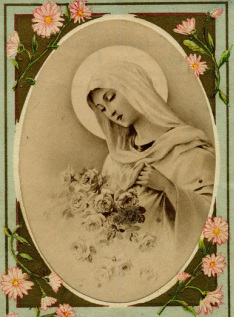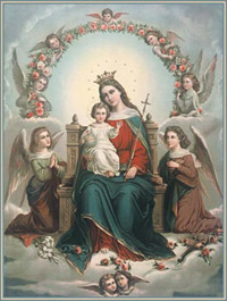
WHILE I was at Rome, in 1845, I had the happiness of making the acquaintance of a good and holy priest named Don Biaggio. He had just succeeded as Superior of the Society of the Missionaries of the Precious Blood to the venerable founder of the society, Gaspard del Bufalo, who had died in 1839, after a life which had been not only holy and apostolic, but resplendent with the glory of miracles.
Among other wonders which Don Biaggio related to me, and of which he had been the eye-witness and sometimes even the happy instrument, the following would doubtless interest my readers. I will relate it, as far as possible, in his own words:
"I was then twenty-three years of age," he said to me," and it was in the year 1814. Pius VII had just returned in triumph to his beloved Rome. From my childhood I had desired to become a priest, but work and study had insensibly impaired my health. I had, nevertheless, been able to ascend the first steps of the sanctuary; I was a deacon. The disease of the lungs from which I suffered had now rapidly developed; I was subject to an intermittent fever, and the doctors spoke most seriously of my case. I did not deceive myself as to the decline of my health, and with the probability of an early death I sought and obtained the favor of being ordained a priest one year before the canonical age.
The fatigues of the examination and the retreat preparatory to my ordination exhausted
the little strength which remained to me. I became seriously ill, and the doctors called in consultation informed me, after a careful examination, that I had reached the third degree of pulmonary consumption, that it was not possible I should recover, and that I had better make all necessary arrangements without delay. The Roman physicians are men of faith and do not follow the deplorable custom, prevalent in some countries, of letting people die without knowing that they are dying, and consequently without being able to prepare themselves to appear before God.
"I decided to go to Loretto and to die there under the eyes of the Blessed Virgin beneath the shadow of the Santa Casa. The voyage was painful, but for a dying man a little suffering-more or less is of small consequence. Arrived at Loretto, I dragged myself to the Holy House, fervently entreating the Madonna to assist me in my last agony. I had been there a few days; my illness was increasing; (one morning when I was feeling weaker than usual, I went early to the sacred sanctuary of our Blessed Mother. According to my custom I knelt down for an instant, leaning against the wall. . . . A young priest whom I did not know, whom I had never seen, came and knelt down near me. We were alone, or almost alone. He then said in a low voice, as though speaking of me, but with his eyes fixed upon the miraculous Madonna: 'Bisogna anche' che presto faccia la missione'—He also must give the mission. I looked at him; it was evident that he was speaking of me. Therefore, still upon my knees, I answered: 'I would do so willingly if I could. . . . But I did not come here to preach; I am in consumption; I am come to die.' 'No, no,' replied the priest with a bright smile; "let us have confidence in Mary!"--"Abbiamo fede in Maria"and he added: "Dite meco un' 'Ave Maria"—'Say an Ave Maria with me.' I repeated the angelical salutation with him, scarcely knowing what it all meant . . . . - ~
"When we had finished, Gaspard del Bufalo (for it was he) rose, signed to me to follow him, and we went out together from the Santa Casa in silence. We crossed the great basilica in which the Holy House of Nazareth is enclosed like a relic, and when we had reached the outer square del Bufalo turned toward me with the look of one inspired. He told me that the Holy Father had entrusted to him the charge of 'giving a series of missions in this part in order to efface as far as possible the fatal effects of the Revolution, of Voltairianism, and of foreign occupation; that he desired to begin by Loretto in order to obtain the help and protection of the Blessed Virgin; but that he was still alone and needed companions. "You will come with me," he added with singular authority. "We will commence the mission to-morrow; you shall preach at such an hour, I at another;" and there, upon the spot, he arranged the order of the services. I thought I was dreaming, I seemed to have been conscious of no kind of physical sensation, either during the Ave Maria or afterward.
"Subjugated by a secret force, and confiding in Mary, who can obtain everything from her divine Son, I made no objection; and the following morning, God and our Blessed Lady helping me, I began to give a series of missions with the servant of God, which continued almost without interruption during twenty-three or twenty-four years, up to the time of his holy, happy death. From that day I have never been ill; nor felt my lungs in the least degree affected."
Don Biaggio died also a few years after in the odor of sanctity. I received this account from his own lips.
Source: "The Faith That Never Dies or The Priest of God in the Catholic Home,"
Imprimatur 1900
A coloring picture for the children can be found below.
Among other wonders which Don Biaggio related to me, and of which he had been the eye-witness and sometimes even the happy instrument, the following would doubtless interest my readers. I will relate it, as far as possible, in his own words:
"I was then twenty-three years of age," he said to me," and it was in the year 1814. Pius VII had just returned in triumph to his beloved Rome. From my childhood I had desired to become a priest, but work and study had insensibly impaired my health. I had, nevertheless, been able to ascend the first steps of the sanctuary; I was a deacon. The disease of the lungs from which I suffered had now rapidly developed; I was subject to an intermittent fever, and the doctors spoke most seriously of my case. I did not deceive myself as to the decline of my health, and with the probability of an early death I sought and obtained the favor of being ordained a priest one year before the canonical age.
The fatigues of the examination and the retreat preparatory to my ordination exhausted
the little strength which remained to me. I became seriously ill, and the doctors called in consultation informed me, after a careful examination, that I had reached the third degree of pulmonary consumption, that it was not possible I should recover, and that I had better make all necessary arrangements without delay. The Roman physicians are men of faith and do not follow the deplorable custom, prevalent in some countries, of letting people die without knowing that they are dying, and consequently without being able to prepare themselves to appear before God.
"I decided to go to Loretto and to die there under the eyes of the Blessed Virgin beneath the shadow of the Santa Casa. The voyage was painful, but for a dying man a little suffering-more or less is of small consequence. Arrived at Loretto, I dragged myself to the Holy House, fervently entreating the Madonna to assist me in my last agony. I had been there a few days; my illness was increasing; (one morning when I was feeling weaker than usual, I went early to the sacred sanctuary of our Blessed Mother. According to my custom I knelt down for an instant, leaning against the wall. . . . A young priest whom I did not know, whom I had never seen, came and knelt down near me. We were alone, or almost alone. He then said in a low voice, as though speaking of me, but with his eyes fixed upon the miraculous Madonna: 'Bisogna anche' che presto faccia la missione'—He also must give the mission. I looked at him; it was evident that he was speaking of me. Therefore, still upon my knees, I answered: 'I would do so willingly if I could. . . . But I did not come here to preach; I am in consumption; I am come to die.' 'No, no,' replied the priest with a bright smile; "let us have confidence in Mary!"--"Abbiamo fede in Maria"and he added: "Dite meco un' 'Ave Maria"—'Say an Ave Maria with me.' I repeated the angelical salutation with him, scarcely knowing what it all meant . . . . - ~
"When we had finished, Gaspard del Bufalo (for it was he) rose, signed to me to follow him, and we went out together from the Santa Casa in silence. We crossed the great basilica in which the Holy House of Nazareth is enclosed like a relic, and when we had reached the outer square del Bufalo turned toward me with the look of one inspired. He told me that the Holy Father had entrusted to him the charge of 'giving a series of missions in this part in order to efface as far as possible the fatal effects of the Revolution, of Voltairianism, and of foreign occupation; that he desired to begin by Loretto in order to obtain the help and protection of the Blessed Virgin; but that he was still alone and needed companions. "You will come with me," he added with singular authority. "We will commence the mission to-morrow; you shall preach at such an hour, I at another;" and there, upon the spot, he arranged the order of the services. I thought I was dreaming, I seemed to have been conscious of no kind of physical sensation, either during the Ave Maria or afterward.
"Subjugated by a secret force, and confiding in Mary, who can obtain everything from her divine Son, I made no objection; and the following morning, God and our Blessed Lady helping me, I began to give a series of missions with the servant of God, which continued almost without interruption during twenty-three or twenty-four years, up to the time of his holy, happy death. From that day I have never been ill; nor felt my lungs in the least degree affected."
Don Biaggio died also a few years after in the odor of sanctity. I received this account from his own lips.
Source: "The Faith That Never Dies or The Priest of God in the Catholic Home,"
Imprimatur 1900
A coloring picture for the children can be found below.
| may_19th.pdf |

 RSS Feed
RSS Feed